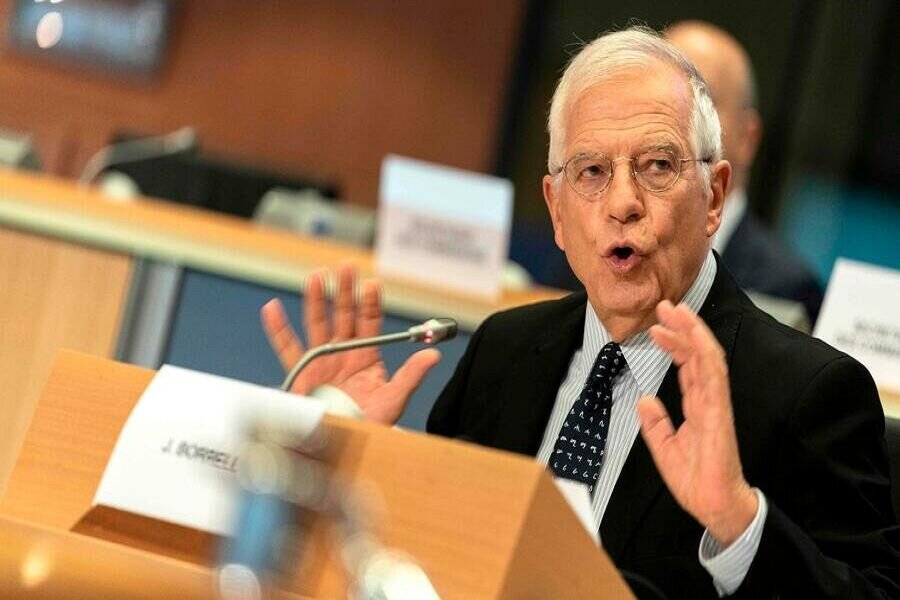Borrell say EU pursues ‘balanced position’ toward Iran

TEHRAN - European Union foreign policy chief Josep Borrell said on Monday that the 27-nation European block follows a “balanced position” toward Iran, noting the EU “puts political pressure when it’s considered necessary, in many areas, and at the same time looks for cooperation when it is necessary.”
Borrell made the remarks as he was reacting to a speech by Slovenian Prime Minister Janez Jansa at a virtual meeting of the terrorist Mojahedin-e-Khalq, which drew strong criticism by Tehran.
The EU’s chief diplomat said the remarks by the Slovenian prime minister does not represent the official position of the European bloc.
Jansa, whose country holds the rotating EU presidency, made controversial remarks against Iran at the meeting. His remarks and his participation at the meeting drew a strong criticism from Iran.
The Iranian Foreign Ministry described the Slovenian prime minister’s move as “unacceptable and undiplomatic.”
In addition to the Slovenian leader, Iran hawks like Congressman Ted Cruz and former U.S. secretary of state Mike Pompeo addressed the conference held this year in Berlin.
Iranian Foreign Ministry spokesman Saeed Khatibzadeh earlier denounced the presence of Western politicians in the virtual event, saying they “sell themselves cheap for a Europe-hosted circus arranged by a once Saddam-backed terrorist cult with Iranian blood on its hands.”
In a phone call with Borrell on Sunday evening, Iranian Foreign Minister Mohammad Javad Zarif asked for a clarification of the EU’s stance regarding Jansa’s “unacceptable participation” at the gathering and his “imprudent remarks”.
Borrell said he had told Zarif that “in our institutional setting, the position of a prime minister — even if he’s from the country that holds the rotating Council presidency — does not represent the position of the European Union.”
“Foreign policy remains a competency of [EU] member states and each member state can have the opinion that it sees fit for each issue of international politics. … For me it’s only up to say whether this position [by Jansa] … represents the European Union. And certainly it does not,” he added.
The EU foreign policy chief further stressed that only the president of the European Council, Charles Michel, could represent the EU at the level of heads of state and government.
“I have nothing to say about the opinions of the Slovenian prime minister,” Borrell said. “It’s his responsibility, but he does not represent the European Union.”
MEK’s unpopularity among the Iranians stems from two things: First, the group had been implicated in many terrorist attacks and assassinations in Iran in the 1980s. Second, while the group was going on a killing spree in Iran, its leaders colluded with Iran’s number one nemesis, Saddam Hussein, the former dictator of Iraq who gave them many military bases near Baghdad. With the military support of Saddam, MEK mounted a devastating military attack on Iran that led to its forever eradication in the country. Iranians have never forgotten, nor have they forgiven, this act of treason by MEK.
In addition, over the past few years, the group has faced growing accusations of receiving money from Saudi Arabia.
The MKO's annual rallies often feature pro-Saudi speakers and sometimes even Saudi officials. For instance, Turki al-Faisal, a Saudi prince, former intelligence chief and key diplomat addressed the group's rallies in Paris in 2016 and 2017, prompting accusations from Tehran that Riyadh supports terrorism.
Salman al-Ansari, president of the Saudi American Public Relations Affairs Committee, a pro-Riyadh lobby group in Washington, also spoke at the MKO conference in Albania on 13 July, 2019.
He was repeatedly interrupted by cheers from the group's supporters as he bashed Iran in both Arabic and Farsi.
In an article published in 2018, Al Bawaba revealed that three tons of gold ingots and four suitcases of Rolex watches were given to the MKO by the Saudis when the group was still in Iraq.
Gold and other valuable commodities were later sold in black markets in the Jordanian capital, Amman, via Saudi-linked businessmen and the money went to offshore accounts linked to the MKO. The Saudis have in fact been supporting the MKO since Saddam Hussein's war against Iran, as the group provided the Iraqi dictator with intelligence and military support, according to Press TV.
